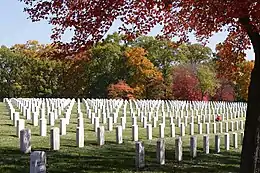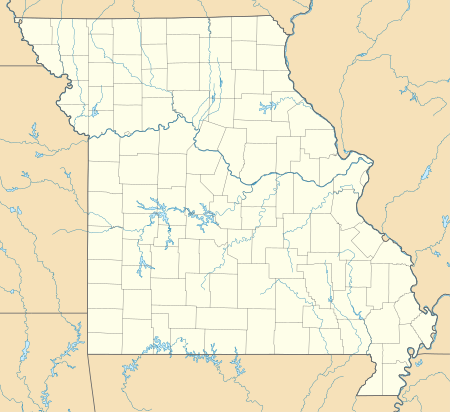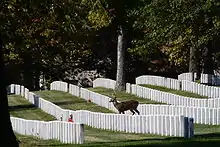Jefferson Barracks National Cemetery
Jefferson Barracks National Cemetery is an American military cemetery located in St. Louis County, Missouri, just on the banks of the Mississippi River. The cemetery was established after the American Civil War in an attempt to put together a formal network of military cemeteries. It started as the Jefferson Barracks Military Post Cemetery in 1826 and became a United States National Cemetery in 1866.
 Jefferson Barracks National Cemetery | |
| Details | |
|---|---|
| Established | 1826 |
| Location | |
| Country | United States |
| Coordinates | 38°29′52″N 90°17′18″W |
| Type | United States National Cemetery |
| Size | 331 acres (134 ha) |
| No. of graves | 188,000+ |
| Website | Official |
| Find a Grave | Jefferson Barracks National Cemetery |
Jefferson Barracks National Cemetery | |
  | |
| Nearest city | Mehlville, Missouri |
| Area | 295.7 acres (119.7 ha) |
| Built | 1866 |
| Architectural style | Late Victorian |
| MPS | Civil War Era National Cemeteries MPS |
| NRHP reference No. | 98000840[1] |
| Added to NRHP | July 9, 1998 |
The first known burial was Elizabeth Ann Lash, the infant child of an officer stationed at Jefferson Barracks.
The cemetery is administered by the Department of Veterans Affairs on the former site of Jefferson Barracks. It covers 331 acres (134 ha) and the number of interments as of 2014 is approximately 188,000. The cemetery is listed in the National Register of Historic Places.
Notable interments
- Medal of Honor recipients
- Major Ralph Cheli (1919-1944), for heroism while leading a bombing mission in World War II.
- Donald D. Pucket (1915-1944), pilot in the U.S. Army Air Forces, for action World War II
- Other notable individuals
- First Lieutenant Michael Joseph Blassie (1948-1972), previously interred as the "Vietnam unknown soldier" at the Tomb of the Unknowns, re-interred here after DNA testing positively identified his remains
- Jack Buck (1924-2002), former St. Louis Cardinals baseball announcer
- Peter J. Cook, the last Spanish–American War Veteran to die.
- Franklin Gritts (1915-1996), Cherokee artist and art director of the Sporting News
- Johnnie Johnson (1924-2005), pioneering rock musician
- Walter Mayberry (1915-1944)- college football player who died in a Japanese POW camp
- Robert McFerrin Sr. (1921–2006), Opera singer
- Henry Townsend (1909–2006), Musician
- Three veterans of the American Revolution buried in the Old Post Section:
- Private Richard Gentry, veteran of the Revolutionary and the Indian Wars. He was present at the surrender of Cornwallis at Yorktown.
- Major Russell Bissell (1756-1807), veteran of the Revolutionary and Indian Wars.
- Colonel Thomas Hunt (1754-1808), a "Minuteman" at the Battle of Concord, April 1775. During the revolution he was wounded at the Battle of Stony Point and Siege of Yorktown. He was also a veteran of the Indian Wars and commanded the 1st Infantry Regiment.
- Other burials of note
- Mass grave of sixty-one merchant marines and sailors who died in the fire aboard the SS J. Pinckney Henderson on August 19, 1943.
- Mass grave for 123 of the 139 victims of the Palawan Massacre[2]
- Remains of 5 crewmen from B-36 Bomber 075 lost on the coast of British Columbia, Canada while conducting a training mission on February 13, 1950
 Jefferson Barracks National Cemetery
Jefferson Barracks National Cemetery
Memorial to the Confederate Dead

A monument entitled Memorial to the Confederate Dead was placed in Jefferson Barracks on May 1st, 1988[3] It is located in section 66 of the cemetery. Not to be confused with the removed Memorial to the Confederate Dead (St. Louis).
_-_Front.jpg.webp)
It was placed by the Jefferson Barracks Civil War Historical Association, Sons of Confederate Veterans, and the Missouri Society Military Order of the Stars and Bars. The front of the monument features three Confederate flags: the first national flag (seven-star variant of the "Stars and Bars"), the Confederate Battle Flag, and the last national flag ("Blood-Stained Banner").
Under the flags is a quote by Berry Benson[4]
To the Confederate Dead 1861-1865 Who knows but it may be given to us, after this life, to meet again in the old quarters, to play chess and draughts, to get up soon to answer the morning roll call, to fall in at the tap of the drum for drill and dress parade and again to hastily don out war gear while the monotonous patter of the long roll summons to battle? Who knows but again the old flags, ragged and torn, snapping in the wind, may face each other and flutter, pursuing and pursued, while the cries of victory fill a summer day? And after the battle, then the slain and wounded will arise, and all will meet together under the two flags, all sound and well, and there will be talking and laughter and cheers, and all will say: Did it not seem real? Was it not as in the old days?”

References
- "National Register Information System". National Register of Historic Places. National Park Service. July 9, 2010.
- Wilbanks, Bob (2004). Last Man Out. Jefferson: McFarland & Company, Inc., Publishers. pp. 152–153. ISBN 9780786418220.
- "Jefferson Barracks National Cemetery".
- Foote, Shelby (1958). The Civil War: A Narrative: Volume 3: Red River to Appomattox. New York: Random House. p. 1048.
External links
![]() Media related to Jefferson Barracks National Cemetery at Wikimedia Commons
Media related to Jefferson Barracks National Cemetery at Wikimedia Commons
- Jefferson Barracks National Cemetery
- St. Louis County: Jefferson Barracks
- Historic American Buildings Survey (HABS) No. MO-1938, "Jefferson Barracks National Cemetery, 2900 Sheridan Road, Green Park, St. Louis County, MO", 16 photos, 20 data pages, 4 photo caption pages
- Historic American Landscapes Survey (HALS) No. MO-2, "Jefferson Barracks National Cemetery, 2900 Sheridan Road, Green Park, St. Louis County, MO", 43 photos, 4 photo caption pages
- U.S. Geological Survey Geographic Names Information System: Jefferson Barracks National Cemetery